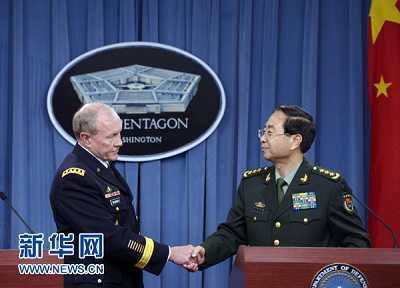Improve Sino-US military ties step by step
- By Shen Dingli
 0 Comment(s)
0 Comment(s) Print
Print E-mail China Daily, May 20, 2014
E-mail China Daily, May 20, 2014
Tours of the aircraft carrier USS Ronald Reagan and the littoral combat ship USS Coronado by Chinese Chief of General Staff, General Fang Fenghui during his visit to the United States are signs of both sides' will to improve military relations.
|
|
|
Chinese Chief of General Staff, General Fang Fenghui shakes hands with U.S. Chairman of the Joint Chiefs of Staff Martin Dempsey at a press conference at the Pentagon on May 15, 2014. [Xinhua photo] |
Fang's landing on the US aircraft carrier is a reciprocal gesture after US Defense Secretary Chuck Hagel was invited to tour the Liaoning, China's first, and so far only carrier. With China's enhanced efforts to render its military more transparent, Beijing and Washington have raised their military exchanges and cooperation to a new level.
Opening the USS Coronado to Chinese military top brass shows the US military's willingness to engage with the Chinese military cooperatively.
In the wake of the US "rebalancing" policy, the Pentagon is aware that the Chinese defense community is wary of the unfolding US notion of air-sea combat, in which its littoral combat ships will assume a critical role in dealing with anti-access and the area denial weapons. As the US' 4th littoral combat ship, the USS Coronado represents cutting-edge naval technology that is both agile and lethal with limited size and tonnage.
With China's rapid rise being accompanied by the modernization of its military, the US has become naturally apprehensive about China's growing capabilities and wary of its intentions. In the same vein, China's concern over the US' response is also natural. Such mutual suspicion, if uncontrolled, could result in an enhanced sense of insecurity if not properly allayed.
To prevent misjudgments, China and the US have been negotiating a Mechanism on Mutual Notification of Major Military Moves. This process, reportedly proposed at the summit between US President Barack Obama and Chinese President Xi Jinping at Sunnylands, California, in June last year, was advanced during General Fang's trip. This together with the proposed Code of Conduct on the Use of Air Space and Maritime Military Security on the High Sea would mean the two militaries have good channels of communication to prevent inadvertent clashes.
Such crisis avoidance mechanisms between China and the US are of particular importance, given the mid-air collision between Chinese and US air force planes in 2001 and the numerous standoffs at sea over the past decade. As political and military trust between China and the US is still far from sufficient, it is unrealistic for each of them not to employ a hedging approach. Subsequently, their respective preparation for the worst-case scenario will go on.
At a time of heightened tension in the East and South China seas, it is more meaningful for Beijing and Washington to be open about their respective intents, and seek collaboration whenever possible. In the East China Sea, both China and the US support the status quo, which offers them common ground. Nevertheless they differ in their judgments of who is changing the status quo in the first place. Washington views Beijing's sending of official vessels to the Diaoyu Islands as constituting the first change in the status quo, while Beijing argues that the vessels are only a response to Tokyo's "nationalization" of the main islands. Still there is overlapping room despite their differences.
In the South China Sea, the situation is not much different. China has claimed all the rock features and the waters in their vicinity within the nine-dash line. For a long time, Beijing's claim met no opposition, whether from other countries in the region or the US. But this is no longer the case as some of its maritime neighbors are changing their position and occupying some of the islands and islets they previously never contested.
Meanwhile, when the UN Convention on the Law of the Sea came into being in 1982, China joined it while reserving its position, and has since proposed shelving differences and jointly developing the disputed areas.
Clearly it is not China that has challenged the status quo on the sovereignty over the rocks and surrounding waters in the South China Sea. And China's reservation on UNCLOS and proposal to shelve the disputes are less well understood and appreciated. This adds to the importance of dialogue and communication, as China deserves to be better understood for its position and practice in this part of the world. As long as the Pentagon is patient and careful, it will find that it shares more common ground than divergence with Beijing on this as well.
Through conversation and collaboration, the Chinese and US militaries can build up mutual trust and a cooperative partnership, as a part of the new type of major-country relationship.
General Fang's visit is another step in this ongoing process.
The author is a columnist with China.org.cn. For more information please visit: http://www.china.org.cn/opinion/shendingli.htm







Go to Forum >>0 Comment(s)